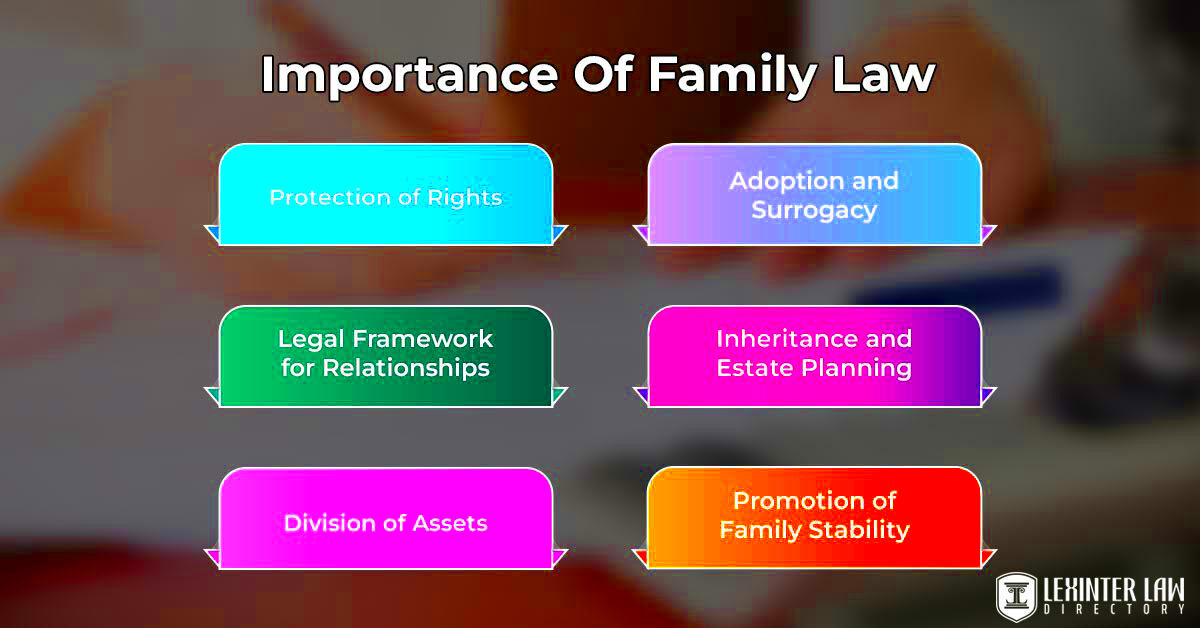Key Aspects of North Carolina Family Law
North Carolina family law encompasses a variety of legal matters that impact families and personal relationships. It is essential in enabling families to address their hardships, either through marriage or divorce, child custody or any other family-related concerns. With knowledge about these laws, people can make well-informed choices as well as safeguard their rights. This branch of law is shaped by state statutes which show its distinctive norms in contrast with what governs other areas of law, case law and common practice; it therefore mirrors the specific social values and necessities among the residents of North Carolina.
Types of Family Law Cases Handled

In every family law case, there are different types of cases which deal with different kinds of family issues. Below are a few cases that are often seen:
- Divorce: The legal dissolution of a marriage, which may include disputes over property, alimony, and child custody.
- Child Custody: Determining where children will live and how decisions about their upbringing are made.
- Child Support: Financial support paid by one parent to another for the care of their children.
- Adoption: The legal process of becoming a parent to a child who is not biologically yours.
- Domestic Violence: Legal protection for individuals who are victims of abuse within a household.
The law needs to be comprehended in a discrete manner with every circumstance, and having an informed lawyer could affect a lot the result.
Child Custody and Visitation Guidelines
Mainly revolving around what would be in the child’s best interest, child custody and visitation are significant elements of family law. As such, custody in North Carolina can be divided primarily into two classes:
- Legal Custody: This involves the right to make important decisions about the child’s life, including education and healthcare.
- Physical Custody: This determines where the child will live on a day-to-day basis.
When parents are separated from each other, they have two alternative choices; either come up with an understanding concerning the custody scheme or allow the judiciary to make a ruling on their behalf. This may be covered by the following:
- The child’s age and maturity
- The relationship between the child and each parent
- Each parent’s ability to provide for the child
- The child’s wishes, depending on their age
Establishing visitation arrangements can also help the non-custodial parent to spend time with the child. However, it is essential that they prioritize the child’s interests in order to create a nurturing background even under circumstances of separation between parents.
Child Support Regulations and Calculations
Family law receives an important aspect through child support that ensures financial support is given to all children by both parents regardless of their living arrangements. In North Carolina, when doing so the courts look into what is best for the child in terms of need and welfare first. This type of assistance enables the meeting of necessary expenses like shelter, food, attire, school fees as well as medical attention.
The computation of child support seems to be complex; however, it mostly follows the North Carolina Child Support Guidelines which put into consideration various elements:
- Income of both parents: The combined gross income of both parents is assessed to determine support obligations.
- Number of children: The amount of support may vary depending on how many children require support.
- Health insurance costs: Any health insurance premiums for the children are included in the calculations.
- Extraordinary expenses: Special needs or additional costs related to education or healthcare may also affect the calculations.
Bear in mind that child support payments ain’t optional; they are enforceable by law. In case one parent does not pay, the other can apply for enforcement from the court which can involve wage garnishment or any other penalties.
Divorce Processes and Requirements
An undemanding procedure that takes place against the backdrop of October 2023 data, residing in North Carolina and going through divorce entails following various steps meant to guarantee equity for all people concerned. Putting in mind how this works may ease someone’s anxiety when dealing with it at a difficult moment.
Behold, below are the main stages of divorce:
- Residency Requirement: At least one spouse must have lived in North Carolina for six months before filing for divorce.
- Grounds for Divorce: North Carolina allows for no-fault divorce, meaning you can file simply because the marriage has irretrievably broken down. Alternatively, you can cite fault-based grounds, like adultery or abandonment.
- Filing the Complaint: The spouse seeking the divorce files a complaint in the appropriate county court, outlining the reasons for the divorce and any requests for support or custody.
- Serving the Papers: The other spouse must be officially served with the divorce papers, which can be done through a process server or by mail.
- Waiting Period: North Carolina requires a one-year separation period before finalizing the divorce.
- Finalizing the Divorce: After the waiting period, you can request a hearing to finalize the divorce, where the court will review any agreements or disputes related to property division, child custody, and support.
Division of Marital Property
When the couple breaks up, one of the most significant matters they encounter is division of matrimony property. The principle guiding divorce property distribution in North Carolina is equitable distribution, meaning that although it may not be split in half, marital belongings are divided justly.
The following are major points to note regarding property division in North Carolina:
- Marital vs. Separate Property: Marital property includes assets acquired during the marriage, while separate property refers to assets owned by one spouse before the marriage or received as a gift or inheritance.
- Factors Considered: The court considers various factors when dividing property, including:
- Length of the marriage
- Contributions of each spouse to the marital property
- Economic circumstances of each spouse
- Any other relevant factors
- Negotiation and Mediation: Couples may choose to negotiate their property division outside of court through mediation, which can save time and reduce conflict.
Discerning the tenets of fair segregation may assist persons to brace themselves for conversations concerning land division thus safeguarding their rights and interests amid this pertinent life change.
Domestic Violence and Protective Orders
Many households are affected by serious domestic violence issues and in response North Carolina has enacted special protective legislation for survivors of this crime. It is important for anyone faced with any cases related to family violence to understand these statutes well. According to state law, domestic abuse encompasses either actual physical injury inflicted on or the imminent danger of inflicting physical injury upon somebody who occupies a particular relationship with the aggressor – including one’s spouse/companion or blood relative.
If you have been a victim of domestic violence, you can file for protective orders or restraining orders to feel safe. Let’s go through the details of this procedure:
- Filing a Petition: A victim can file a petition for a protective order at their local courthouse, explaining the incidents of violence and why they need protection.
- Temporary Orders: The court may issue a temporary order, which can provide immediate protection until a full hearing takes place.
- Hearing: A hearing will be scheduled where both parties can present evidence and testimony. The judge will decide whether to grant a permanent protective order.
- Duration: Protective orders can last for a specific period or be made permanent, depending on the situation.
Be aware that breaching a protective order carries heavy penalties for the offender, including but not limited to arrest and prosecution. It takes guts to ask for help and there are resources in North Carolina for domestic violence victims.
Frequently Asked Questions about Family Law in North Carolina
In family law, the complexity is often immense but individuals tend to seek answers on their rights and choices. Here are some common queries about family law in North Carolina:
- What is the waiting period for a divorce?
The waiting period is one year from the date of separation before you can finalize your divorce. - How is child custody determined?
The court considers the best interests of the child, including factors like the child’s age, relationship with each parent, and living situation. - What is equitable distribution?
Equitable distribution is the legal principle that guides the division of marital property, ensuring a fair, though not necessarily equal, split. - Can a protective order be modified?
Yes, if circumstances change, either party can petition the court to modify the terms of the protective order. - How is child support calculated?
Child support is calculated based on both parents’ incomes and the needs of the child, following the North Carolina Child Support Guidelines.
In case you have any particular inquiries regarding your own circumstance, reaching out to a family law practitioner can bring forth some illumination along with direction that suits your requirements.
Conclusion on Family Law in North Carolina
Families are affected by various issues under North Carolina’s family law including; divorce, child custody, domestic violence among others. Although these legal waters can be hard to maneuver, knowledge of your rights and choices is important to avoid making uninformed decisions.
The correct information and support can help you deal with a divorce, making custody arrangements, or getting out of domestic violence. In this situation, it is always better to consult a lawyer who will assist you with these processes, ensuring your rights are protected and family issues are prioritized. In North Carolina, family law is designed to serve as an avenue for equitable resolutions with the focus on children’s and families’ well-being.


